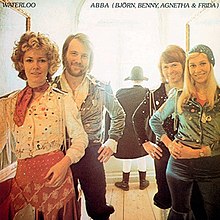Waterloo (album)
| Waterloo | ||||
|---|---|---|---|---|
 |
||||
| Studio album by ABBA | ||||
| Released | 4 March 1974 | |||
| Recorded | 24 September 1973 – 20 February 1974 | |||
| Studio | Metronome Studios, Stockholm | |||
| Genre | ||||
| Length |
38:10 (original release) 44:47 (reissue 2001) |
|||
| Language | English and Swedish | |||
| Label |
Polar Epic (UK) Atlantic (US original release) |
|||
| Producer | ||||
| ABBA chronology | ||||
|
||||
| Singles from Waterloo | ||||
|
||||
Waterloo is the second studio album by the Swedish pop group ABBA, and the first released internationally. It was originally released in Sweden on 4 March 1974 through Polar Music. The album's title track won ABBA the 1974 Eurovision Song Contest and became a worldwide smash-hit, launching the group's career.
Recording sessions for Waterloo began on 24 September 1973 with the track "Dance (While the Music Still Goes On)". This song was unusual in that it is the only ABBA track not to feature member Benny Andersson on keyboards, but instead featured American pianist John Rabbit Bundrick who was in Sweden at the time. Bundrick, however, was not credited on the album. Three weeks later the next two songs ("Suzy-Hang-Around" and "My Mama Said") went into the studio. A recording sheet from the day credits the artist as "ABBA", the first time the name was ever used in writing, the group until now being called "Björn & Benny, Agnetha & Anni-Frid", although their manager Stig Andersson had informally been calling them ABBA with the media for some time. The former of these songs marks the only time Benny Andersson sang lead on a track. 17 October saw the recording of two more tracks; "What About Livingstone" and "Honey Honey" - the latter being the second single released from the album in most countries. "King Kong Song" was recorded on 14 November, a song which members Benny Andersson and Björn Ulvaeus today single out as one of their weakest tracks. This was also the date in which it was announced that ABBA were to appear at the Swedish selection for the 1974 Eurovision Song Contest. From that point, recording sessions speeded up and the rest of the tracks were recorded. Two songs were up for consideration for their Eurovision entry; "Waterloo" and "Hasta Mañana". The group preferred the former but felt the latter was a more safe bet. Ultimately they chose "Waterloo" as it was more the direction they wished to take the group. "Waterloo" and "Watch Out" were recorded on the same day - the songs that made up the lead single and its B-side.
"Waterloo" swept to victory at the Swedish heats and the group represented Sweden in Brighton for the Eurovision Song Contest 1974. ABBA won the contest and "Waterloo" became not only a massive hit in Europe but all over the world (peaking at No.6 in the US for example). In Sweden, the album had already been released as topped the Swedish album charts for 12 weeks, becoming one of the biggest-selling Swedish albums ever to that point. In the UK the album made No.28 - the first time a foreign Eurovision act had charted an album and it performed well in the rest of Europe.
...
Wikipedia
